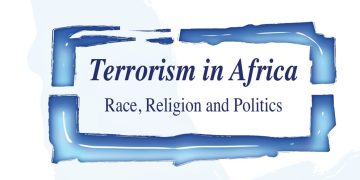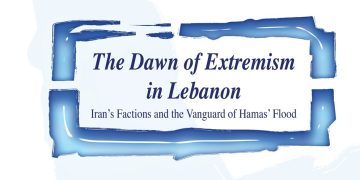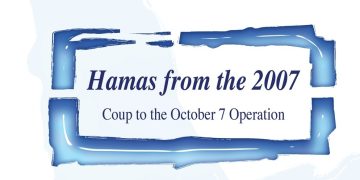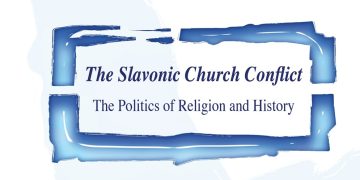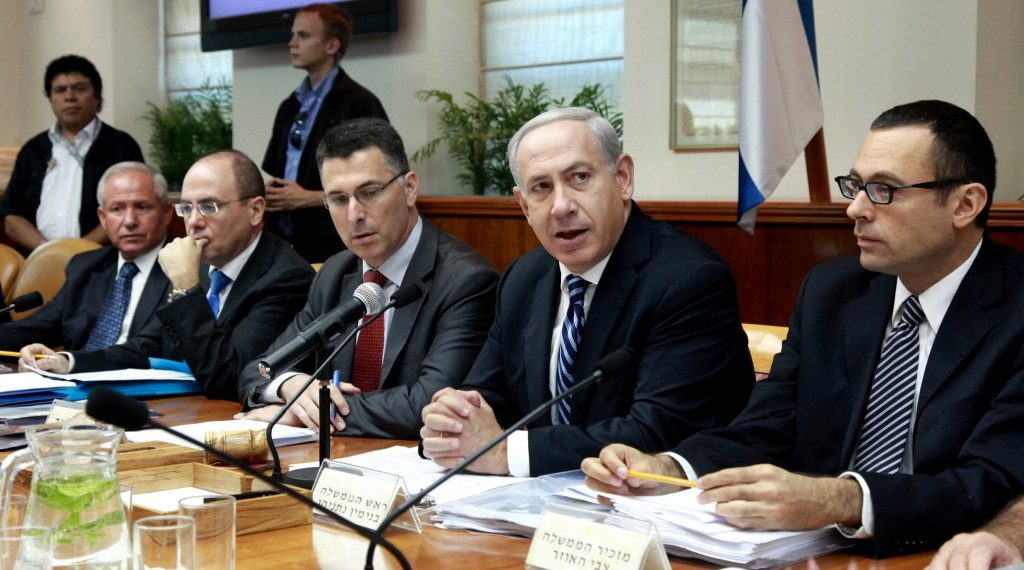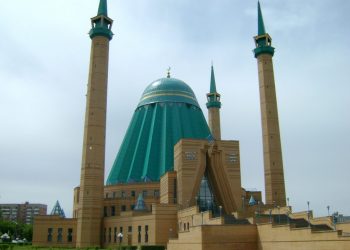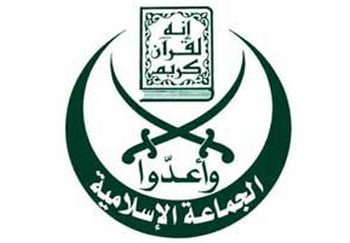From the outset, the Arab Spring has taken the world by storm. It both challenged the political status quo in the Middle East and attempted to write a new chapter in the history of the region. The State of Israel—with its complex geostrategic position and its difficult relations with its neighbors—was equally astounded when protests initially broke out throughout the region. Since then, Israel has responded to the shifting regional realities with a mix of timid hope and strong hesitance.
On the one hand, the current paradigm within Israel is that, in the long term, the potential process of democratization of the region could represent an opportunity for the country to improve its relations with some of its immediate neighbors. However, in the shorter term, there is widespread skepticism regarding the so-called Arab Spring.
To some observers within Israel, the ongoing social and political unrest in the Middle East spells trouble. The crumbling of pre-existing regimes is seen as a potential threat to regional security and stability. There is also a general uneasiness towards the rise of Islamist political parties. These organizations are believed to have stronger and more antagonist feelings towards the State of Israel than the pre-existing authoritarian regional regimes. As such, there is widespread concern that they will translate their anti-Israeli attitude into the official foreign policy of the countries where they now control large shares of political power. It is therefore assumed that the current shift in the region’s political arena and the rise of political Islam will benefit the “Resistance Camp” in general, and groups like Hamas and Hezbollah specifically, while negatively affecting Israel.
However, not all political observers within Israel share this negative assessment. Many analysts dismiss this type of analysis as being overly simplistic, emphasizing instead the importance of taking a more case-by-case approach when assessing the overall impact of the ongoing social and political changes. Similarly, they assert that Islamist organizations in the region are far from monolithic, and that the rise of the “Muslim Brotherhood-brand” of political Islam actually negatively affects the popularity of armed groups like Hezbollah.
This chapter analyzes the main attitudes adopted within Israel with respect to both the Arab Spring as well as the subsequent rise of Islamist political parties across the Middle East. In doing so, it emphasizes the distinct postures adopted with respect to the different regional cases. Finally, the chapter looks at post-Arab Spring shifts in Israel’s geostrategic and political position, looking specifically at the impact emerging Islamist parties are having in redefining existing relations.
Israel’s Response to the “Arab Awakening”: Hope and Hesitance
When protests first broke out in Tunisia in late 2010, Israel first took a wait-and-see approach, refraining from making public statements in support of either Zine El Abidine Ben Ali’s regime or the opposition forces. This is hardly surprising, given the state of the relation between the two countries. After a brief period of honeymoon during the 1990s—where both Tunisia and Israel opened interest offices in their respective counterparty—relationships had frozen following the beginning of the second intifada in 2000. Since then, Tunisia has severed all official ties with the State of Israel, preserving however unofficial exchanges in sectors like trade and tourism.
All in all, Ben Ali was therefore not seen as a regional ally. Even so, the protests were not greeted with overwhelming enthusiasm.
Firstly, upon the fall of the autocratic regime, the Israeli PM Binyamin Netanyahu indirectly referred to Tunisia by expressing concern for the increased volatility of the Middle East and by wishing that “stability would be restored.” He also stressed how the unstable situation in the region further proved that Israel’s focus should remain on preserving its own national security.
In addition to this general concern regarding regional stability, a number of Israeli officials addressed the regime change in Tunisia more directly. They expressed apprehension over the future of the unofficial ties between the two countries; worrying that the leadership change in Tunisia would lead to severing the relationship it previously held with Israel. Israeli vice Prime Minister Silvan Shalom—himself born in Tunisia—took these concerns one step further by voicing the fear that Tunisia would begin to drift towards the “extremist forces in the Arab world,” referring to groups like Hamas or Hezbollah. From an Israeli perspective, the shift towards a political arena controlled or heavily influenced by political Islam is seen with inherent suspicion, as the common understanding is that such parties will display strong anti-Israeli attitudes and will further complicate Israel’s standing in the region.
Similar concerns were also voiced by the media and think-tank world, where the regime change was equally analyzed as a potential source of regional instability, especially in light of the potential “demonstration effect” of the protests on Israel’s neighbors, especially Jordan and Egypt.
In contrast to the relative understated reaction to the protests in Tunisia, Israel’s response was stronger and unequivocal when the demonstrations sparked by the Arab Spring spread to Egypt. On the one hand, the relationship between Israel and the Mubarak regime was far from perfect, with the Egyptian government never fully investing in creating a de facto peace with Israel following the 1979 treaty. Also, Hosni Mubarak was known to cultivate, and even foment, anti-Israeli feelings amongst his population as deflection from criticizing his regime. On the other hand—despite the clear problems in the relation—still the Israeli government largely credited Mubarak with having preserved peace and stability for roughly three decades. Therefore, it is no surprise that at the beginning of the anti-government demonstrations Israeli officials largely hoped that the status quo would be restored. This is the case even though the general policy of the government was to refrain from making public statements about the crisis or in support of any of the warring parties.
In the assessment of former chief of general staff MK Shaul Mofaz, the best scenario for Israel would have been for the regime to overcome the protests.
In addition, Israel went beyond statements in signaling its support of the Mubarak government. The government allegedly attempted to diffuse American and European’s criticism of the Egyptian regime, and it also allowed Egyptian troops to deploy in the Sinai (Israel’s agreement is needed as per the terms of the 1979 peace treaty).
With the escalation of the protests, more Israeli officials went on record and expressed their concerns over the stability and security of the region, stressing the importance Israel places upon preserving the peace treaty with Egypt. Israel in fact sees the agreement as one of the cornerstones of regional stability. For instance, former Israeli Defense Forces (IDF) chief of general staff Lt.-Gen. Gabi Ashkenazi stated that the unrest could represent a threat to Israel, a concern seconded by PM Netanyahu, who also stressed the importance of investing in security arrangements, as well as on preserving the peace treaty.
The concerns voiced over Egypt largely coincided with those already expressed over regime change in Tunisia. However, in the case of Egypt, the stakes were seen as substantially higher, not only because of the existing peace treaty between the two countries, but also because of Egypt’s geostrategic position and its influence on the regional balance of power. This is why the Israeli PM openly expressed the fear that Iran would attempt to stir the Egyptian uprisings in its direction, trying to increase its leverage in the post-Mubarak era. In Israel’s view, such increase of Tehran’s influence is clearly identified as a direct security threat.
However, this growing anxiety over the state of the peace treaty, the calm along the Israeli-Egyptian border, and the rising influence of Iran gradually diminished in the days following the resignation of Mubarak, with Israel Defense Minister Ehud Barak immediately seeking (and reportedly obtaining) reassurances regarding the peace treaty with chief of the Supreme Council of the Armed Forces (SCAF), Field Marshal Mohamed Hussein Tantawi.
Even so, a few months into the Arab Spring, the emerging consensus within the Israeli political establishment was still deeply pessimistic. In addition to perceiving the ongoing political change as a potential threat to regional stability, there was also growing skepticism over the revolts’ potential to lead to a true democratization process.
PM Netanyahu expressed this paradigm already in April 2011, when he stated that “[w]hat we hope to see is the European Spring of 1989,” adding however that there was an increasing chance of encountering an “Iranian Winter.” The PM was referring to the growing perception that the uprisings were being increasingly hijacked by Islamist groups, a notion commonly referred to in Israel as the
“Islamic winter.”
A few months later, in November 2011, the PM went even further by stating that “the chances are that an Islamist wave will wash over the Arab countries, an anti-West, anti-liberal, anti-Israel and ultimately an anti-democratic wave.“
Of course, the escalation in the level of skepticism regarding the Arab Spring has been going hand-in-hand with the rise of Islamist parties and the perception that “[t]he biggest winner of the past year is political Islam – in Tunisia, Libya, Egypt, and (perhaps soon) in Syria.”
This is especially the case when analyzing the reactions to the rising popularity of Islamist groups in Egypt—where the Muslim Brotherhood and the Salafists together won over two thirds of seats in the Egyptian Parliament. Even though the government of Israel officially congratulated Egypt on its newly elected legislative body, the country is extremely troubled by this trend and it has not found a way to open a channel of communication with Egypt’s Islamists. As the next section will analyze more in-depth, it is hardly a surprise that the rise of the vehemently anti-Zionist Muslim Brotherhood is seen by Israel as troublesome trend, especially when combined with an extremely antagonist public opinion.
Therefore, when looking at the evolving Arab Spring and the subsequent regime changes occurring in both Tunisia and Egypt, the concerns of Tel Aviv include a threat to regional stability, an opening for Tehran to increase its influence, a potential challenge to the continuation of the peace treaty with Egypt, and, last but not least, the rapid rise of political Islam in the Middle East. Furthermore, the possibility that the “troubles” could further spread and affect Jordan—the second regional player to have signed an official peace treaty with Israel—has also been perceived as a concrete threat resulting from the Arab awakenings.
However, not all political observers within Israel concur with this pessimistic assessment of reality. For instance, Lior Ben-Dor, the Foreign Ministry’s Arabic media spokesman has asserted that, from Israel’s perspective, “(…) by and large little has changed. They don’t hate us any less than before. But not any more than before, either.”
In addition to diffusing fears stemming from the Arab uprisings, a number of Israeli political observers and politicians have also been openly referring to them as a potential opportunity for Israel. Israeli President Shimon Peres stated: “Poverty and oppression in the region have fed resentment against Israel and the better our neighbors will have it, we shall have better neighbors,” arguing that regional democratization is exactly what Israel needs to be more secure and prosperous. Within the media and the think tank world, many analysts have argued along the same lines, stressing how none of the deposed regimes—including in Egypt—has ever been genuinely interested in building a positive relation with Israel. Furthermore, they have equally noted that the Arab Spring has so far not empowered Israel’s regional foes, like Iran, and it has also negatively affected the popularity of other anti-Israeli groups like Hezbollah.
Finally, political observers within Israel have been asserting that political Islam is not monolithic in its orientation and attitude towards Israel, while also debating whether the political rise of Islamist parties will lead them to “being rather more ambivalent about their hostility to Israel, or at least about the urgency with which they intend to act on it.”
A clear case where Israel has been struggling between its fears and hopes is the example of Syria. On the one hand, Israel sees the demise of Bashar al-Assad and his regime as a strong blow against Iran, as well as an opening to begin a new chapter with its northern neighbor. In addition, over the past months, Assad sporadically sparked clashes with Israel along the Golan Heights as a tool to divert domestic attention from the anti-regime protests. The clashes between the IDF and Palestinian refugees in May and June 2011 were in this sense seen by Israel as part of Assad’s attempts to shift the domestic attention away from local demonstrations. Although few within Israel believe that Assad would ever risk entering a full-fledged military confrontation against Israel, still the demise of Assad and his regime would remove the threat of these renewed skirmishes at the border.
On the other hand, the Israeli government has been worried about the potential rise of yet another Islamist regime at its own border. Furthermore, even though Israel never trusted or particularly liked the Alawite regime in Syria, still the Assads had showed both restrained and predictability, avoiding direct confrontations with Israel and keeping the quiet of the border. In this sense, Israel worries about the collapse of the Syrian state and the potential creation of a vacuum of power within Syria, and specifically next to the Israeli-controlled Golan Heights.
As such, especially in the early stage of the protests, Israel had a lively public debate regarding whether the country should support Assad or the anti-government opposition forces. For example, Druze MK and member of the ruling Likud Party Ayoub Kara openly stated: “I prefer the political extremism of Assad over religious extremism,” adding “[w]e don’t want religious extremism on the border.” On the other hand, national infrastructure Minister Uzi Landau claimed the exact opposite by stating: “[t]he only thing I know is that if he [Assad] falls there will be big short-term advantages.”
In the early months of the Syrian crisis Israel chose to keep a low profile, while denying any direct involvement with either Assad or the opposition. For instance, in an April 2011 interview Israeli PM Netanyahu openly said that, on Syria, “Any answer I’ll give you wouldn’t be a good one,” hinting to the awareness that an open endorsement of the Syrian opposition forces would hinder their domestic stance and legitimacy, while strengthening Assad’s accusations that the opposition is a ‘puppet’ of Israel and the United States.
Even though the general Israeli policy was to stay out of the Syrian crisis, still a number of Israeli politicians came out in support of the protests even in these relatively early stages. In March 2011 Israeli President Shimon Peres expressed solidarity with the protesters by stating: “[d]emocracy needs to be allowed into a country the moment the young generation opens its eyes. The young people have questions about why they are living in poverty. A family that cannot provide food for itself is tragic.” Also, in May 2011, Israeli MK Shaul Mofaz reportedly urged Russia to stop supplying advanced weaponry to the Syrian regime in the context of a meeting between the members of the Knesset Foreign Affairs and Defense Committee and their counterparty in Russia.
In the following months, as the Syrian crisis escalated in both size and intensity, Israel gradually switched from ambivalence to direct condemnation of the Syrian regime. This shift occurred together with the realization that Assad was not likely to survive the political storm ignited by the protests. By the end of 2011, the general assessment within Israel was that the Assad’s regime was doomed and that its fall was indeed “inevitable.” In this context, Israel first offered humanitarian aid to Syria through the International Committee of the Red Cross in March 2012, with Foreign Minister Avigdor Liberman stating: “[e]ven though Israel cannot intervene in events occurring in a country with which it does not have diplomatic relations, it is nevertheless our moral duty to extend humanitarian aid and inspire the world to put an end to the slaughter.”
Then a few weeks later, following the intensifying of the violence of the Syrian regime (and specifically after the massacre of civilians in Houla on May 25 2012), Israeli Defense Minister Ehud Barak went beyond mere condemnation and said: “[t]hese events in Syria compel the world to take action, not just talk, but action. These are crimes against humanity and the international community must not stand on the sidelines.”
In this later stage of the Syrian crisis Israel has taken a very different posture from that assumed during the protests in both Tunis and Cairo, assuming a more positive attitude with respect to a possible regime change.
This of course does not mean that Israel has resolved its extremely conflicted relation with the ongoing uprisings, with the country pondering whether the short term instability will be rewarded with a genuine democratization process, or whether new authoritarian and Islamist regimes will rise on the ashes of the previous ones, further complicating Israel’s position in the Middle East. Until this point is further clarified, Israel’s attitude will continue to be a mix of timid hope, hesitance, and skepticism.
Israel and its Neighbors after the “Spring”: Change and Continuity in the Shadow of the Regional Rise of Islamist Parties
With Israel perceiving the Arab Spring as both a potential threat as well as an opportunity, the Israeli government has been closely watching how the relationships of the country have evolved with the new “post-Arab Spring” governments, respectively in Tunisia and Egypt.
Firstly, when it comes to analyzing the changes within Tunisia, Israel does not perceive the situation as particularly worrisome, nor does it see a substantial deterioration in the (already weak) ties. Even after the Islamist Ennahda party won the Constituent Assembly’s elections in October 2011, Tunisia has still been perceived as a potential “model” for the Arab Spring. The country is seen as embarking in a democratic transition, while attempting to strike a balance between secular and religion values and while looking to emulate Turkey, rather than Iran.
Even so, there a few issues that the Israeli government perceives as problematic. Firstly, there has been growing worries over the future of Tunisia’s ancient Jewish community. On the issue Ennahda and its government have been giving somewhat mixed signals. On the one hand the government has been firm in reiterating its desire to protect all citizens, regardless of religion. For instance, Tunisian President Moncef Marzouki participated in the ceremony commemorating the ten year anniversary of the 2002 Al Qaeda attack against the El Ghriba synagogue in Djerba and stated “any vandalism or violence against the Tunisian Jewish people, their property or their holy sites is totally unacceptable.” Similar declarations have also come from Ennahda party leader and Prime Minister Hamadi Jebali, who has also openly stated Tunisia’s desire to welcome Jewish pilgrims to visit the El Ghribe synagogue. On the other hand, in the past year there have been a few episodes where Salafist groups have publically called to wage “war against the Jews”. For example, during the visit of Hamas leader Ismail Haniyeh, organized by Ennahda in January 2012, a group of Salafists greeted him by chanting “[k]ill the Jews.” Ennahda responded to these chants by expressing condemnation and adding that it believed that: “these slogans, which contradict the spirit of Islam, (…) were uttered by a fringe group aiming to undermine Ennahda’s activities and tarnish its image.” Even so, the party has been criticized as being “too soft” on the Salafists and as not doing enough to protect the country’s Jewish community from this type of attacks.
Of course the Hamas’s visit per has been also a reason for mild concern from an Israeli perspective, as the country fears that the rise of Islamist groups in the region will strengthen the standing and status of Hamas, while weakening Fatah and the secular-nationalist alternative within the Palestinian society. In this sense, Ennahda‘s invitation to Hamas was seen as a partial confirmation of this trend, although in reality the visit has not really translated into any concrete political cooperation.
Secondly, Israel has also been closely watching the ongoing debate over Tunisia’s future constitution, focusing specifically on the dispute regarding inserting a clause that would ban all ties with Israel and prohibit “normalization.” Adding the “anti-normalization” clause in the constitution has been supported by both Islamist parties, including Ennahda, as well as leftist Arab nationalist parties, led by the Tunisian Communist Labour Party. In addition to enshrining this principle in the constitution, there have also been talks about inserting a clause in the penal code to sanction individual and companies that hold any relations with Israel. However, there is no consensus over these issues, with Ennahdha Foreign Minister Rafik Abdessalem opposing the insertion of such clause in the constitution, while reiterating that Tunisia would never recognize Israel anyways. In this sense, Ennahdha has been unequivocal in its rejection of either recognizing or upgrading ties with Israel.
Indeed, the constitutional debate can be seen as a sign of the increased antagonism towards Israel, itself a direct consequence of the rise of political Islam in Tunisia. But in fact this trend is also a reflection of the internal political struggle between more mainstream Islamist parties, like Ennahdha, and the Salafist political forces within Tunisia. Specifically, Ennahdha‘s tough stance on Israel can be seen as stemming from its values and history, but also as a byproduct of the party’s attempt to appease the Salafist groups.
Even so, the debate regarding banning all ties with Israel should not just be analyzed as a consequence of the rise of Islamist parties, as the main proponents of the clause have actually come from the ranks of the extreme left. What’s more, the ongoing discussion also reflects the general negative attitude of the domestic public opinion towards Israel. As such, anti-Israeli feelings go deeper and extend beyond the Islamist ranks.
The concerns Israel faces when analyzing post-Arab Spring Tunisia do pale when compared to the progressive strains in the security, economic, and political relations between Israel and its neighbor, Egypt. From an Israeli perspective, post-Mubarak Egypt is presenting a whole new set of challenges that go well beyond the rise of political Islam in the country.
Firstly, Israel has seen Egypt as increasingly less stable and able to provide security within its borders, which in turns has been raising fears over the proliferation of jihadists groups in the Sinai area, a direct security threat to Israel. Understandably these fears were further heightened after August 2011, when a Palestinian militant cell entered Israel from the Sinai and perpetrated an attack in the south of country, near Eilat. The attack also constituted a powerful reminder of the frail state of the Israeli-Egyptian relations. In fact, while pursuing the attackers, Israel engaged in cross-border shootings, killing five Egyptian security officers. In turn, this led to massive anti-Israel protests within Egypt, culminating with the Egyptian government—pressured by the public outcry—threatening to withdraw its Ambassador from Tel Aviv. While the bilateral diplomatic crisis was diffused after Israel expressed regret for the deaths and announced an investigation into the matter, Israel remained largely unpopular on the Egyptian street. In turn, this led to a fully-fledged assault on the Israeli Embassy on September 9, 2011—marking an all-time low in bilateral relations.
Following the August attack, Israel has allowed Egypt to deploy more troops in Sinai to conduct counter terrorism operations, while the Israeli government has continued to coordinate with Egyptian security forces. Even so, the Israeli government remains worried about the perceived vacuum of power within Sinai.
Secondly, in the months since the fall of the Mubarak regime, Israel has been increasingly concerned over the progressive deterioration of the economic ties with Egypt, especially with respect to its willingness and capacity to export gas to Israel. In the past year, pipelines delivering Egyptian gas to Israel were periodically attacked, until Egypt decided to unilaterally suspend gas deliveries in April 2012. Both Egyptian and Israeli authorities were quick in diffusing the crisis and asserting the suspension was not motivated by political reasons. Egyptian authorities referred to both the “unfair” deal Israel got under Mubarak as well as to Israel’s alleged violations of the agreement as the causes of the suspension. However, the interruption of the gas exports is indeed a sign of the ongoing deterioration of a bilateral relation that was never fully “normalized” to begin with.
In this sense, both the deterioration of the security situation in Sinai and the downgrading of economic ties are both tightly related with the main issue that Israel has been facing since the collapse of the Mubarak regime: the souring of the political and diplomatic relations with Egypt. This trend can be equally represented by both the arrest of an alleged Israeli “spy” in June 2011 (later release in a “face saving” prisoner swap in October 2011), as well as by the already mentioned violent storming of the Israeli Embassy only a few months later.
The latter episode also showed the internal divide between the SCAF, focused on diffusing internal unrest, as well as preserving calm with Israel and good ties with the US, and a growingly more anti-Israel public opinion.
These anti-Israel demonstrations can also serve to assess the impact that Islamist groups are having in shaping the foreign policy debate in the “new” Egypt. Again, even more than in the case of Tunisia, anti-Israeli feelings within Egypt run very deep and go beyond the influence of Islamist parties. However, Islamist parties have been adding fuel to the anti-Israeli fire. For instance, in March 2012 the Islamist-dominated lower house of the Egyptian Parliament issued a declaration calling Israel the number one enemy of the country.
From an Israeli perspective this type of rhetoric is certainly troublesome. At the same time, Israel is also aware that the inflammatory statement adopted by the lower house of the Parliament is only declaratory and has no concrete policy effect. As such, Israel is now attempting to understand the difference between the anti-Israeli discourse employed by Islamist parties for electoral gains, and the actual policies they intend to implement. Furthermore, Israel also seeks to understand the different postures of the main Islamist parties on this issue, working on the assumption that political Islam is far from monolithic within Egypt. Both questions are seen as crucial to understand the future of the Israeli-Egyptian relation, as well as the stability of the peace treaty—which is certainly seen by Israel as the number one issue in determining such future.
Since the fall of Mubarak, in fact, the SCAF has been quite clear in pledging to “honor previous commitments, including the peace treaty with Israel.” However, there has been a lot more ambiguity on the issue coming from Egypt’s main Islamist political parties.
Firstly, the Muslim Brotherhood has held an ambivalent attitude regarding the peace treaty with Israel, alternating conciliatory remarks with “war declarations” and pledges to end the treaty. This ambiguity is not surprising. On the one hand, anti-Zionism has been a strong feature of the Muslim Brotherhood since the founding of the group in the late 1920s. In addition, the Brotherhood has over the past decades been a champion of the Palestinian cause, while preserving ties with the Palestinian Hamas, which itself started as the Gaza-based branch of the Brotherhood. Similarly, within Egypt, the group had opposed the peace treaty back in 1979 and has in the past decades been unequivocal in its rejection of any normalization process. As such, acting to end the peace treaty with Israel would stem as a corollary of both the Brotherhood’s history as well as its ideology.
On the other hand, in practice, the Muslim Brotherhood has also shown a remarkable understanding of realpolitik, and specifically of the correlation between preserving the peace treaty and continuing to receive the badly needed US aid. On this matter, when an Egyptian-American crisis broke out in February 2012 over the investigations of a number of civil society groups and democracy activists (including a number of US citizens) and the US threatened to withhold aid, the Brotherhood message was clear: “We (Egypt) are a party (to the treaty) and we will be harmed, so it is our right to review the matter.”
As a result of this internal struggle between ideology and pragmatism the group has adopted a somewhat ambivalent position on the peace treaty. While it has not ruled out reviewing some terms of the treaty, the Brotherhood has by and large reiterated it will neither attempt to abrogate it nor put to a national referendum (an option the group had initially raised). However, from an Israeli perspective, even the prospects of “revisions” is seen as highly alarming and the country will likely use its influence, as well as rely on the United States—the guarantor of the agreement—to make sure this option is shelved. This is because Israel sees opening the treaty up for negotiation as tantamount to its collapse, and, therefore, it opposes this possibility.
At the same time, Israel has also been increasingly more willing to let Egypt deploy more of its troops in the Sinai, opting for a de facto, rather than a de jure, revision of some the treaty terms.
On the issue of preserving the peace treaty ambiguity has come also from Egypt’s second main Islamist force, the Salafi al-Nour party, which has similarly declared it would seek to at least alter some its terms, while pledging not to revoke it.
In addition, Israel’s sees the ascent of the Muslim Brotherhood as a potential threat for two additional reasons: the possibility of an improvement in the Egyptian-Iranian relation, as well as the positive effect the Brotherhood’s political power could have on Hamas. With respect to Iran, a number of leaders of the Muslim Brotherhood have in fact urged Egypt to upgrade its ties with the Islamic Republic, even though the alleged rapprochement is far from significant at this stage.
Similarly, Israel fears that the pre-existing ties between the Brotherhood and Hamas will both boost Hamas politically as well as allow the “free flow” of weapons to and from Gaza. However, in reality, Egypt has continued—beyond its rhetoric—to hold a pretty tight grip on Gaza, also to the detriment of Gaza’s civilian population. Furthermore, when it comes to empowering Hamas and encouraging “radicalization,” it actually seems that the Muslim Brotherhood has instead used its influence on the group to pressure the Gaza-based Islamist organization to work towards true reconciliation with Fatah. The group has also declared to agree with Hamas’s de facto acceptance of coexistence of Israel, while specifying the Muslim Brotherhood would not object to a two-states solution “provided that this state within the ’67 borders is completely sovereign in air and in sea and in land.”
These declarations are seen as encouraging by some political observers within Israel, while others are more skeptical and point out that accepting an interim two-states solution is very different from relinquishing all outstanding claims and recognizing the end of the conflict. Based on these contrasting assessments there is an ongoing policy and scholarly debate within Israel on whether the political rise of the Muslim Brotherhood will in fact help to moderate, rather than radicalize, Hamas.
In this context of deliberate ambiguity and Israeli anxiety over the rise of the Muslim Brotherhood, it is not surprising to note Israel has been preoccupied with the Egyptian Presidential elections. While both emerging candidates, Muslim Brotherhood’s Mohamed Morsi and former Egyptian Air Force general Ahmed Shafik have asserted their will to preserve the peace treaty, Morsi is largely perceived as far more antagonistic to Israel.
Regardless of who will become President, Israel’s policy with respect to Egypt will have to adjust to a different political arena. It is clear that the new bilateral relationship will not be forged only with the new political establishment and the army, but—for the first time—the public opinion will also have a saying in how the relationship continues. At the moment, this represents more a threat than an opportunity to Israel, given that over half of the Egyptian population seems in favor of annulling the peace treaty with Israel, while 85 percent view Israel negatively.
As a result, it is likely that Israel’s policy with respect to Egypt in the short-term future will be “minimalist,” focusing on preserving the peace treaty while beefing up security at its own border. Other more ambitious goals, like improving ties and reopening the “normalization” chapter, appear less realistic and will likely have to be shelved.
And indeed, this is very much in line with Israel’s policy so far with respect to the Arab Spring. The country first chose to keep a very low profile when responding to the shifting regional dynamics. This choice was the result of two considerations. Firstly Israel—aware of its own unpopularity in the Middle East—wanted to stress it did not want to interfere with local political processes. Secondly, there was also the understanding that the country truly lacked the political and diplomatic tools to have a direct impact, thus acting as an outsider.
In this sense the policies adopted have been largely passive, more focused on maintaining the peace treaties—both with Egypt as well as with Jordan—while postponing more ambitious political goals.
Within Israel, there has been much debate on whether such ‘passive’ approach should be supplemented with a more active component. For instance, several Israeli political observers have argued that in order to improve its regional standing in the “new” Middle East, Israel needs to revive the Israeli-Palestinian peace process. Specifically, the argument has been that Israel needs to “to ease the burden on the residents of the West Bank and Gaza Strip, and inter alia, to reach understandings with Hamas (…) and withdraw its objection in principle to a thaw in relations between Fatah and Hamas (…).” Progress in the Israeli-Palestinian arena and commitment to review the presence in the West Bank is then seen as crucial to help Israel’s standing in the region. In other words, in addition to responding to the Arab Spring by investing in security and beefing up the borders, there is much debate within Israel on how to adopt a more proactive political stance.
The current policy on Syria is object of the same debate, with the political arena divided. On the one hand, many affirm Israel cannot do anything beyond providing humanitarian assistance. On the other hand, a number of political observers argue that the country should go one step further, either by providing safe heaven to Syrian refugees, by sharing intelligence on the Syrian regime with the world, or even by covertly helping the opposition. However, at the moment, the policy on Syria has largely remained ‘passive’, fearing that any direct involvement would backlash on Israel while also hurting the stand of the anti-Assad opposition.
Israel and the Arab Spring—Reactions and Policies
Since the Arab Spring first began in Tunisia in December 2010, a process of rapid social and political transformation has been occurring within the Middle East. In the cases of Egypt and Tunisia the initial protests led to a mostly nonviolent regime change and to the demise of old authoritarian regimes. In other cases, like in Libya, the collapse of the old government came as a result of a bloody internal war.
And still the turmoil is not over. Over a year after the initial beginning of the uprisings, there are a number of countries in the region—from Syria to Bahrain—where the anti-regime protests are still in full swing. And even in countries where the Arab Spring has not “arrived” full force—like Lebanon or Jordan—still the impact of the ongoing regional transformations can be felt locally. In other words, since December 2010, the political ground has been shaking in the entire region.
In this context, it is not a surprise that Israel has been very much following the ongoing political dynamics with a mix of hope and fear. From an Israeli perspective, the Arab Spring can be seen as a potential threat: both the increased volatility of the region and the rise of political Islam are in fact perceived as worrisome trends. At the same time, however, the ongoing social and political transformations could represent an opportunity for the country to begin a new, more positive, chapter in its regional relations, especially if the democratization processes succeed and result in the creation of more open and pluralistic countries. However, although Israel believes that “democracies do not go at war with each other” and that a more free and democratic Middle East can indeed be an asset, still there is widespread skepticism towards the capacity of the Arab Spring to deliver such results.
Looking specifically at the case of Egypt the consensus seems to be that things will likely get worse before they get better. This impression is fueled by the souring of the security, economic, and political relations with Egypt since the collapse of the Mubarak regime, as well as by the unequivocal rise of Islamist parties—like the Muslim Brotherhood—who have adopted openly anti-Israel stances. In addition, the negative feelings the Egyptian public opinion holds against Israel further indicate that the state of the bilateral relations may continue to deteriorate in the coming months.
These mixed feelings have resulted in a somewhat ambivalent posture with respect to the ongoing regional transformation. Israel has largely attempted to keep a low profile and ‘weather the storm’ produced by the uprisings. At the moment, the priorities have become preserving the existing peace treaties with both Jordan and Egypt, while focusing on investing on border security. In the longer term, there is a debate within the Israeli society over what steps—starting from committing to deliver concrete progress in the Israeli-Palestinian arena—the country needs to take to adopt a more proactive attitude and improve its regional standing.
This paper first appeared in the E-Book, The West and the Muslim Brotherhood After the Arab Spring, co-published in 2013 by Al-Mesbar Center for Research and Studies and the Foreign Policy Research Institute.


